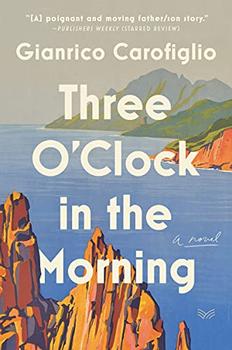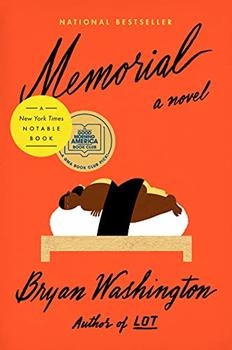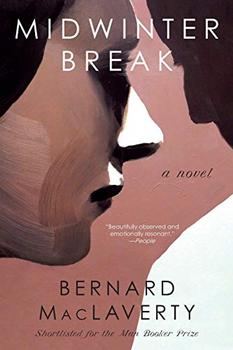Summary | Excerpt | Reviews | Beyond the book | Read-Alikes | Genres & Themes | Author Bio

Critics' Opinion:
Readers' Opinion:
First Published:
Mar 2021, 192 pages
Paperback:
Apr 2022, 192 pages
 Book Reviewed by:
Book Reviewed by:
Rebecca Foster
Buy This Book
The quotation that gives Gianrico Carofiglio's tender novel its title is from F. Scott Fitzgerald's The Crack-Up: "In a real dark night of the soul it is always three o'clock in the morning." It lends an appropriate sense of time suspended, of earnest seeking and extreme circumstances: The main action of the book takes place over just a few days in June of 1983, when teenage Antonio and his father are stranded in Marseilles. The gift of this time outside of time allows them to get to know each other better, such that the memory of the trip will be precious to Antonio even decades later.
Looking back from 2017, Antonio recalls that he first had episodes of sensory overload and fainting at age seven. After his parents separated when he was nine, he lived with his mother and rarely saw his father. He was eventually diagnosed with idiopathic generalized epilepsy. Doctors advised him to avoid all stimulation, from crowded places to soda. Seizures would occasionally land him in the hospital, but his mother had him tell his classmates that he had fallen and gotten a concussion — epilepsy was surrounded by a whiff of stigma.
When in 1980 the chance arose for Antonio to be seen by an epilepsy specialist in Marseilles, his parents leapt to take advantage of it, accompanying him to the Centre Saint-Paul. After many tests, Professor Henri Gastaut cut Antonio down to one medication and said he would see him again in three years. He reassured the teenager that epilepsy seemed to be associated with creativity: Geniuses from Aristotle to Dostoevsky were said to have had it.
After the three years have passed, the family receives word that Professor Gastaut is due to retire soon and would like to reassess Antonio's condition. This time Antonio is accompanied by just his father. When they arrive in Marseilles, they are surprised to hear that the professor wants Antonio to go off his medication and stay awake for the next 40 hours or more to see what happens to his brain. So the father and son extend their short stay and go off to buy two days' clothing, wondering how they will pass so many hours in a strange city.
To start with, they seek out the usual tourist sights — visiting a famous church, taking a boat trip to the cliffs and having a picnic on the beach within sight of the island where The Count of Monte Cristo opens. They later bounce between restaurants, bars and a late-night jazz club. By the second evening, they've made acquaintances on the beach and are invited to a bohemian party replete with North African food and drug-taking. It's an eventful couple of days for Antonio, who is eager to have his first real sexual experience. I could imagine Woody Allen making a sparkling comedy like Moonlight in Paris with this material.
But it's in the quieter moments that Antonio and his father, a mathematics professor, make memories that will last a lifetime. Antonio realizes that he and his father have never really talked before. Now, with the hours stretching ahead of them, their conversations go deep and wide, ranging from their shared interest in numbers to how Antonio's parents met at college. Carofiglio often steps back in these moments, offering less in the way of narration and allowing the dialogue to shine, showing the characters' relationship building naturally through discussion and observation of body language.
While some readers probably prefer their fiction to cover a larger canvas, I appreciated how the limited time and place heightened this short novel's emotions. The focus on just a few days makes every incident stand out, authentically reproducing what it's like to spend time in a different country: When everything is new, your senses are intensified and it feels like time slows down. Carofiglio invites readers to peer between the leisurely progression of events to see the bond that is being formed.
I enjoyed discovering a new-to-me author in this translation by Howard Curtis thanks to HarperVia (see Beyond the Book), and I'd recommend Three O'Clock in the Morning for a weekend's armchair traveling or for pre-Father's Day reflection on the roles fathers play in their children's lives. As Antonio explains, "Two nights without sleep weaken you, slow down your reflexes, blur your vision, but they give you a very subtle, precise sense of what really matters." This offbeat, nostalgic work reminds us of the things that are most important in life.
![]() This review was originally published in The BookBrowse Review in April 2021, and has been updated for the
April 2022 edition.
Click here to go to this issue.
This review was originally published in The BookBrowse Review in April 2021, and has been updated for the
April 2022 edition.
Click here to go to this issue.

If you liked Three O'Clock in the Morning, try these:

by Bryan Washington
Published 2021
What happens when a love story collides with the limits of love--and everyone has an opinion?

by Bernard MacLaverty
Published 2018
For readers of Colm Toíbín, a moving portrait of a marriage in crisis and a couple's search for salvation.




Flaming enthusiasm, backed up by horse sense and persistence, is the quality that most frequently makes for ...
Click Here to find out who said this, as well as discovering other famous literary quotes!
Your guide toexceptional books
BookBrowse seeks out and recommends the best in contemporary fiction and nonfiction—books that not only engage and entertain but also deepen our understanding of ourselves and the world around us.